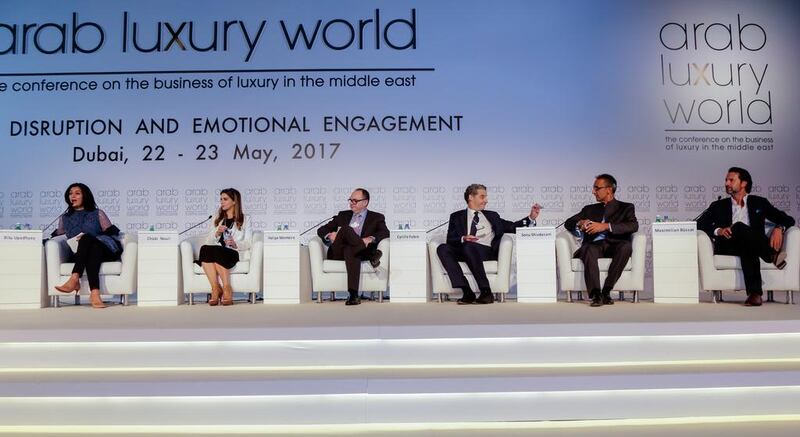The two-day Arab Luxury World conference was held in Dubai on May 22 and 23. The forum brought together a number of heads of luxury labels, all of whom discussed – and debated upon – the theme of this year’s conference: digital disruption and emotional engagement. Here are some highlights from the event.
1. Everyone’s a millennial
Much has been said, written and memed about those born in the 1980s, who are currently at the peak of their spending power. However, as Cyrille Fabre, partner at Bain & Company, pointed out: “Technically, millennials are a specific age group, but in reality, the concept is a state of mind.” Reverse mentoring may well be the order of the day, as this young and dynamic group has the power to influence and even convert people older and younger than they. This then translates to the kinds of things people buy – footwear, perfumes and cosmetics are seeing an upward trend – and the things they avoid – silk and leather.
2. People in the UAE want to save hard, spend harder
American Express conducted 754 face-to-face interviews with people who earn at least Dh23,000 per month from six countries: the UAE, Bahrain, Qatar, Lebanon, Oman and Kuwait. In the Spending Trends in the Region talk, AmEx Mena’s vice president, Graziela Martins, stated that while saving money in 2017 emerged as the top priority across the region, most people surveyed in the UAE said they would spend at least as much as they did in 2016, or up to 25 per cent more on luxury goods and experiences this year. The main reasons cited for this are that people are more confident about their jobs, and also feel good about the economy.
3. The great mall commute
Ever wondered why the road between Abu Dhabi and Dubai is so busy on a Thursday evening? It could be because 38 per cent of Abu Dhabi residents are embarking on their weekly visit to The Dubai Mall, Mall of the Emirates and/or Ibn Battuta, while 21 per cent from Dubai are making their way to Yas Mall or Marina Mall. At least that’s what a Mall Mapping survey, which included 4,800 people from the two emirates, suggested.
4. The small miracle that can be social media
The Future of Luxury talk touched upon a topic that has been trending for some time now: does social media contribute to or detract from the experience of buying luxury products and signing up for tailor-made services? Maximilian Büsser, one of the speakers and founder of the niche watchmaking brand MB&F, summed it up quite aptly. He noted that the company’s presence on Facebook and other social-media platforms did not result in immediate sales. However, he said: “Social media opens up a dialogue – between us and our customers, but also between us and our fans. I’m not sure if it helps to sell our timepieces, but it builds the MB&F community. This is important in an age when, let’s face it, your brand would not exist without the internet.”
5. Digital versus humane experiences
As the digital debate raged on, strategist Martin Roll narrated an anecdote. “I travel like a backpacker, nobody would recognise me on an airplane,” said the adviser to some of the world’s most important Fortune 500 companies. “Yet, when I boarded a Singapore Airlines flight recently, the stewardess instantly greeted me by my name, handed me my preferred newspapers and even stuck on a hand-written note welcoming me on board. That human touch is, to me, true luxury – something digital can never hope to match.” Upon which, Hussein Freijeh, general manager of Snap Chat Middle East, quipped: “But if it weren’t for digital means, the airline would not recognise you nor have all this information about you in the first place.” The Passions and Emotions seminar the two men were part of concluded on the note that true luxury uses digitisation as an enabler to provide a more personal and hence more precious experience. The challenge is to find a balance.
pmunyal@thenational.ae






